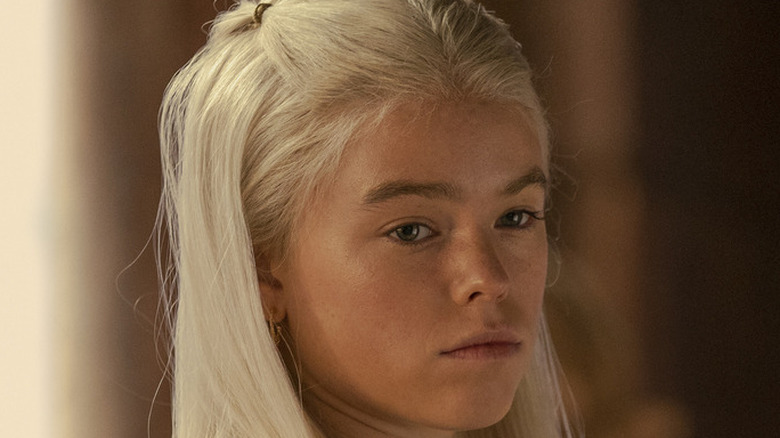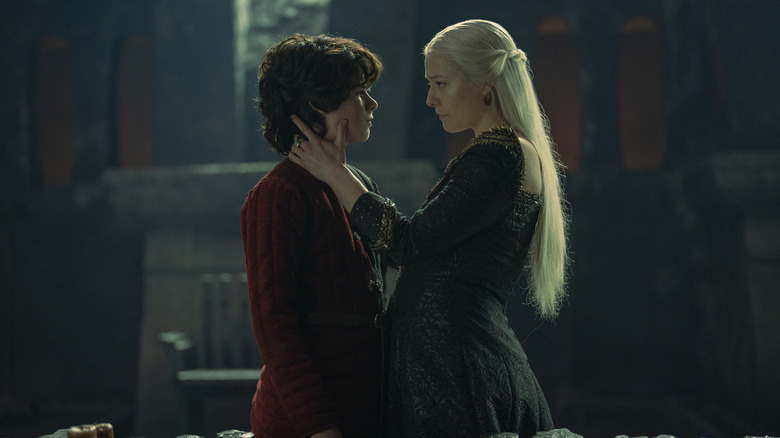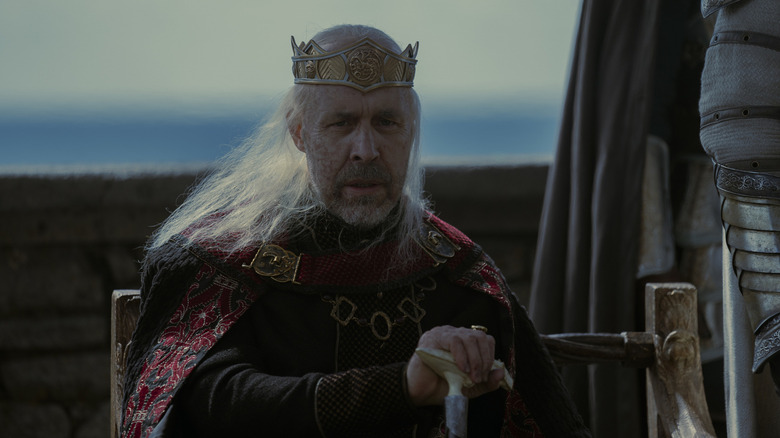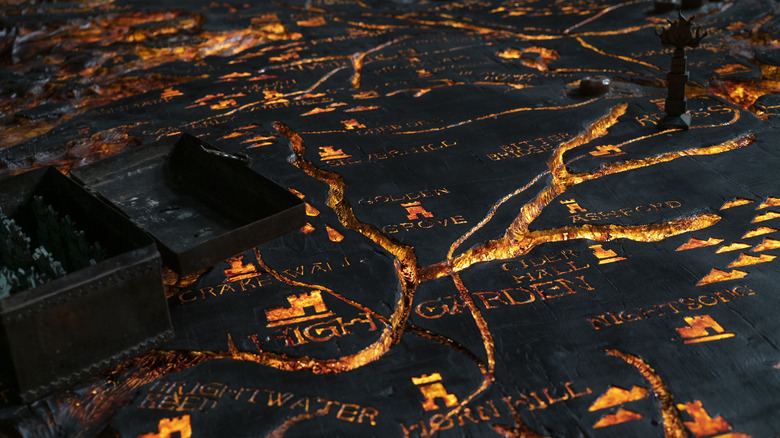Why House Of The Dragon's First Season Was Both Too Fast And Too Slow
When "Game of Thrones" came to an end in the spring of 2019, fans had a lot of complaints, one of which was the incredibly rushed and often disorienting pacing during the final two seasons. For a show that, in its early seasons, made it quite clear that Westeros was an enormous landmass and devoted a ton of time to the show's cast of characters endlessly traversing the varied terrain, it certainly played fast and loose with the time-space continuum starting in the seventh season. Suddenly, characters more or less appeared wherever the plot demanded and were apparently able to fast-travel whenever necessary — the most egregious example being one guy sprinting from the far North to Eastwatch and then sending a raven across the country to Dragonstone, only for the recipient to arrive like an hour later. Beyond that, even character arcs were put on fast-forward; while it was probably inevitable that Daenerys Targaryen (Emilia Clarke) would pull a full Mad King by the series' end, it sure did happen in the blink of an eye.
All of this is to say that when "House of the Dragon," the first spin-off and prequel in the "Game of Thrones" franchise, premiered in 2022, expectations were... cautious, especially when it came to this series repeating the sins of its predecessor. In particular, everyone wanted to see what the show's pacing might be like — and as it turns out, "House of the Dragon" created its own weird pacing problems in due time.
House of the Dragon's pacing is super confusing
To be absolutely fair to "House of the Dragon," which covers the intense, bloody Targaryen civil war known as the Dance of the Dragons, has a ton of things to cover throughout however many seasons it ultimately gets. (In the wake of the premiere's absolutely insane viewership numbers, the series was, at least, hastily renewed for a second season.) To that end, the majority of the episodes of "House of the Dragon" feature some sort of time jump, ranging from just six months to an entire decade — we thought Matt Smith was playing Daemon Targaryen on this show, not reappearing as the time-traveling Doctor.
To add to that, as each time jump occurs, the actors could possibly change and add to your overall confusion. Though some changes are obvious, as with Milly Alcock and Emily Carey handing their reigns as Rhaenyra Targaryen and Alicent Hightower to Emma D'Arcy and Olivia Cooke as the characters grow from their teenage to adult years, some are a lot harder to pin down... especially when it comes to the show's children. Basically every adult character on the show has children, and even after the time jump that introduces D'Arcy and Cooke, some of those children are played by three actors, while others are played by two. It can be at best exhausting and at worst baffling to keep track of the youngest players on the show, and between that and trying to figure out exactly how much time has passed between the current episode and the one you're watching, the pacing is incredibly difficult to track.
Season 1 of House of the Dragon was all set-up... and very little payoff
Beyond that, the pacing itself was incredibly uneven; either the series is jumping ten years in the future without showing us important events like Rhaenyra's affair that produces three of her children, or it's lingering on one event for an absurdly long time. Sure, we need the political intrigue that comes from characters talking and plotting in dark rooms, but it's tough to reconcile scene after scene of politics when there's bloody work that needs doing; at the very least, a better balance between the two may have helped. Again, this is a constraint of the source material — for example, King Viserys I Targaryen (Paddy Considine), suffers from an illness that seems like it should probably take him out pretty quickly, considering how frail he is. However, he manages to last until the end of the eighth episode, partly because of the way that the story is laid out in George R.R. Martin's "Fire & Blood" books, which never feels like it makes much sense; what if the series had been able to kill Viserys halfway through and start the Dance of the Dragons in earnest?
To that end, perhaps the most frustrating part of the first season of "House of the Dragon" is that it tees up the Dance without actually getting there. Sure, the season ends with an incredibly cinematic (albeit darkly lit) dragon battle that ends in the first major casualty of the war — one of Rhaenyra's sons at the hands of his own uncle — but to be given such a small taste of such an exciting conflict feels like too little after a first season that stalled so often.
How will Season 2 of House of the Dragon fare?
That's not to say that the first season of "House of the Dragon" isn't pretty good — it might even be great. Every performer across every age gap brings 110% to their roles; Alcock, Carey, D'Arcy and Cooke are a formidable quartet of actors, and thanks to their talents, the passing of the torch felt as seamless as possible. When it comes to actors like Fabian Frankel, Eve Best, and Rhys Ifans, who have played the same characters since the pilot, they settled beautifully into their roles, inhabiting their world fully and succeeding in giving audiences a brand new generation of Westerosi characters to feel conflicted over. The dragon lore, which isn't confined to just three dragons, is so much more fleshed out, and the production, from the locations to set design to Ramin Djawadi's characteristically lush score, are all stunning.
The biggest issue, of course, is that the first season of "House of the Dragon" was required to do a lot of legwork to set up the certain bloodbath coming in the second, and that does, in the end, feel unavoidable. Still, the pacing could have been smoother, rather than being rapidfire (and skipping major events) or plodding (long moments of exposition), when all is said and done.



